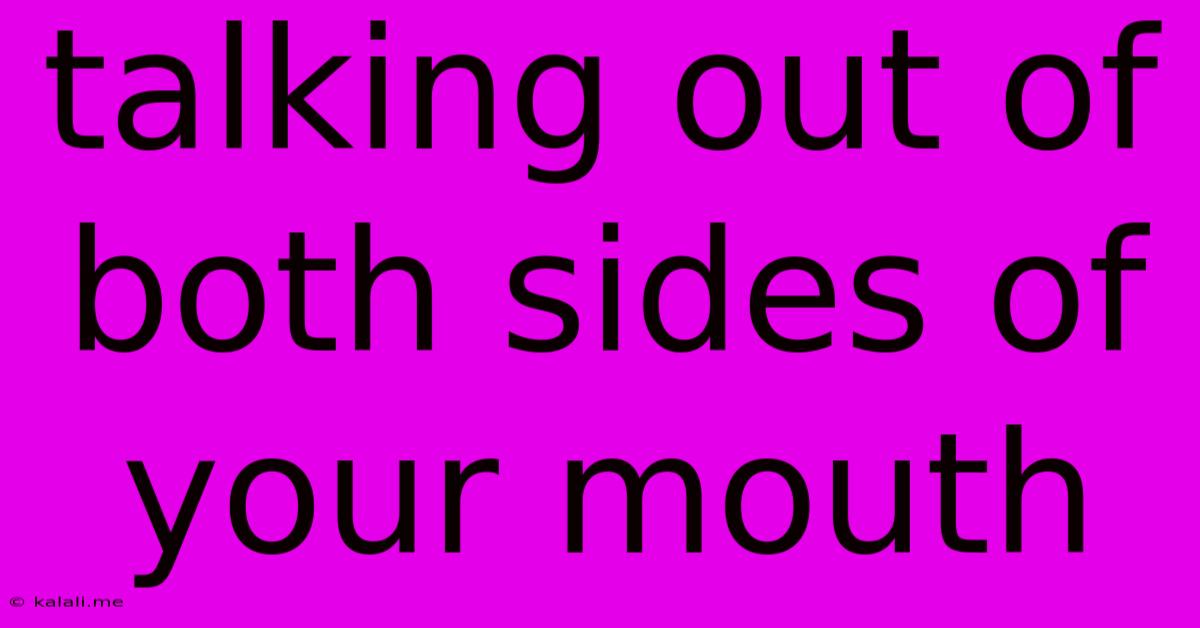Talking Out Of Both Sides Of Your Mouth
Kalali
May 28, 2025 · 3 min read

Table of Contents
Talking Out of Both Sides of Your Mouth: Understanding and Addressing Double-Speak
The phrase "talking out of both sides of your mouth" paints a vivid picture of hypocrisy and inconsistency. It describes someone who says contradictory things, often to manipulate or deceive. This behavior, while seemingly simple, has far-reaching consequences in personal relationships, professional settings, and even politics. This article delves into the reasons behind this behavior, its various forms, and strategies to identify and address it, both in others and ourselves.
What exactly is "talking out of both sides of your mouth"? It's a form of deception characterized by expressing conflicting opinions or stances depending on the audience or situation. It's about presenting different versions of the truth to suit different needs, often without acknowledging the inherent contradiction. This can range from minor inconsistencies to blatant lies and manipulative tactics. Understanding the root causes is crucial in addressing the issue effectively.
The Psychology Behind Double-Speak
Several psychological factors can contribute to this behavior:
- Cognitive Dissonance: This occurs when a person holds two or more conflicting beliefs, ideas, or values. To reduce the discomfort, they may rationalize their actions or distort reality, leading to contradictory statements.
- Self-Preservation: Sometimes, people engage in this behavior to protect their self-image or avoid negative consequences. They might say one thing to appease someone and another to maintain their own position.
- Manipulation: Deliberately using contradictory statements to control or influence others is a manipulative tactic. This aims to confuse the listener and gain an advantage.
- Lack of Self-Awareness: In some cases, individuals might be genuinely unaware of the inconsistencies in their statements. This isn't necessarily malicious but still damaging to their credibility.
Recognizing the Different Faces of Double-Speak
Double-speak isn't always blatant. It can take subtle and sophisticated forms:
- Equivocation: Using ambiguous language to avoid committing to a clear position.
- Euphemisms: Substituting harsh or unpleasant terms with softer alternatives to mask the reality.
- Straw Man Fallacy: Misrepresenting someone else's argument to make it easier to refute.
- Gaslighting: Manipulating someone into questioning their own sanity or perception of reality.
How to Identify and Address Double-Speak
Whether it's in a personal or professional context, recognizing and confronting double-speak requires careful observation and strategic communication:
- Document inconsistencies: Keep records of contradictory statements to present a clear picture of the situation.
- Ask clarifying questions: Instead of directly accusing, politely ask for clarification on conflicting statements.
- Point out the contradiction calmly: Once inconsistencies are evident, gently highlight the discrepancy without getting emotional.
- Set boundaries: If the double-speak is intentional and manipulative, establishing firm boundaries is crucial.
- Self-reflection: If you suspect you might be engaging in double-speak yourself, honest self-reflection and a commitment to authenticity are key.
The Importance of Honesty and Consistency
Talking out of both sides of your mouth erodes trust and damages relationships. Cultivating honesty and consistency in communication builds stronger bonds, both personally and professionally. It fosters mutual respect and creates a foundation for meaningful interactions. Ultimately, integrity and authenticity are far more valuable than short-term gains achieved through deception. By understanding the nuances of this behavior and employing effective strategies, we can navigate these complex situations with clarity and grace.
Latest Posts
Latest Posts
-
How Long Does It Take Poly To Dry
May 30, 2025
-
I Am Looking Forward To Hearing From You
May 30, 2025
-
Take A Pause Between Each Meeting
May 30, 2025
-
Drill Bits Titanium Vs Black Oxide
May 30, 2025
-
Convert Non Clickable Url To Clickable Url Google Sheets
May 30, 2025
Related Post
Thank you for visiting our website which covers about Talking Out Of Both Sides Of Your Mouth . We hope the information provided has been useful to you. Feel free to contact us if you have any questions or need further assistance. See you next time and don't miss to bookmark.